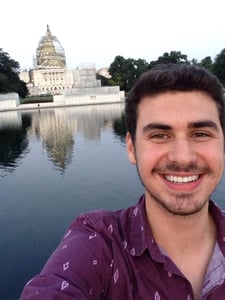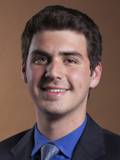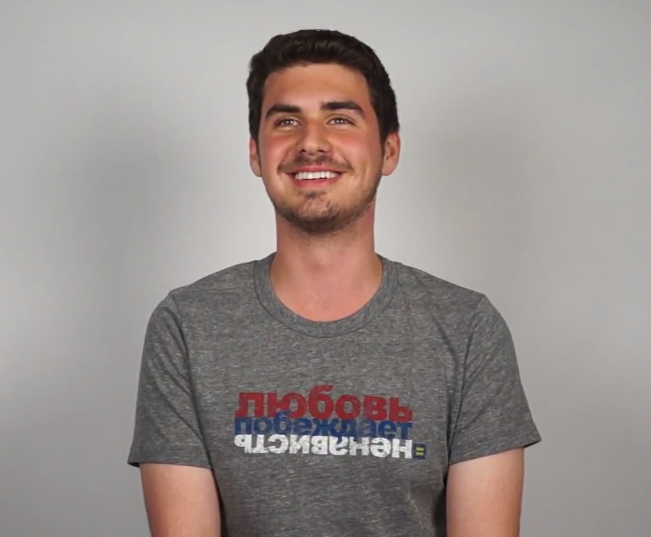Brian as an HRC summer intern.
This summer was a big one for me. Not only was it my first formal internship, but it was also the first time I spent any extended period outside of California (although I had a great time, I now know for sure that the West Coast is the best coast). I spent this summer in DC, where I had the incredible privilege of interning for the Human Rights Campaign. I worked specifically in the Health and Aging Program, which focuses on LGBT health care access and equity.
My day-to-day consisted of helping to administer and keep track of the Healthcare Equality Index, a national survey and report of how inclusive hospitals and health systems are in their treatment of LGBT patients and visitors, which helps members of the LGBT Community make informed decisions about their care. Additionally, the program has facilitated the training of thousands of hospital staff on becoming competent in LGBT patient-centered care. For most of these trainees, this is the first time they are truly informed about LGBT patient issues, which speaks to the incredible importance of the Health and Aging Program’s work in making our health care system inclusive and affirming.
This post was originally going to be about all the fun I had in DC: I got to see all the monuments and the Capitol, I got to make some awesome friends and explore the city with them, I got to shake Vice President Biden’s hand (I can die happy now), and I learned how to survive summer in a literal swamp.
However, the thing that struck me most about my summer was just how quickly the topic of conversation changed after the Obergefell v. Hodges decision came down. It seemed that the rest of the world had moved on from LGBT issues, much to the detriment of those in our community whose well-being depends on far more than marriage equality.
There is definitely so much more that needs to be done.

Photographic proof that Brian did spend the summer in DC. Sadly his phone died before he shook Vice President Biden's hand.
There are so many causes that the LGBT community can take on and issues that we need to address, but unfortunately talking about all of them would take many blog posts. Since my career interests are in health, I want to talk about the work necessary for the LGBT community in that field, specifically regarding HIV. In some ways, the LGBT community has shifted its focus away from HIV in the past decade. Today, young gay and bisexual men and trans individuals have become even more disproportionately affected by HIV—in fact, the former group has seen its rates of HIV transmission jump to 130% of what they were just 10 years ago, the greatest increase of any demographic. Among men of color, this statistic is even worse.
And yet, medicine has come very far during this time. The development of comprehensive antiretroviral therapies (ARV) has made living with HIV a chronic condition rather than a death sentence. In fact, current treatment suppresses the virus so effectively that a patient’s viral load is almost zero, meaning infection spread is almost impossible. This means that if everyone currently infected started and stayed on treatment, the epidemic would be almost gone in a generation. Unfortunately, the reality is far different, as only 40% of those living with HIV are actually in treatment.
This is due to a lot of reasons, as many people simply don’t have access to the care they need, are reluctant or unable to start treatment due to social or economic impacts, or may not even know they are infected (about 1 in 7, according to AIDS.gov). There are a lot of opportunities for advocacy and destigmatization: working to increase access to preventative strategies (like PrEP), focusing on LGBT-inclusive sexual health education for K-12 students, and directing outreach to specific communities to combat cultural or language barriers, among many others.
It gives me so much hope that we have the potential to virtually erase the epidemic in my lifetime, but in order to do that we can’t afford to get complacent. This is not to say that we shouldn’t be proud of how far we have come as a community, or that we can’t celebrate our accomplishments.
All this means is that we have to proceed with the same tireless resolve, and to support and uplift the work already being done in the name of equality.
This post was written by HSBC Point Scholar Brian Kaplun
 Brian Kaplun grew up in Los Angeles, California, with his wonderful family and friends. There, although immersed in a vibrant LGBTQ neighborhood, he observed much of the stigma and inequity associated with this community, which molded his desire to become a staunch advocate for equality. Brian spearheaded The Health-Ed Equity Project campaign to enact LGBTQ equality in health education in California, calling for the inclusion of topics such as sexual orientation, gender identity and expression, and safe sex for all in the education curriculum.
Brian Kaplun grew up in Los Angeles, California, with his wonderful family and friends. There, although immersed in a vibrant LGBTQ neighborhood, he observed much of the stigma and inequity associated with this community, which molded his desire to become a staunch advocate for equality. Brian spearheaded The Health-Ed Equity Project campaign to enact LGBTQ equality in health education in California, calling for the inclusion of topics such as sexual orientation, gender identity and expression, and safe sex for all in the education curriculum.
Read more about Brian here.

